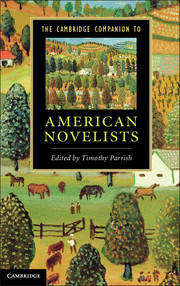Book contents
- Frontmatter
- Contents
- Contributors
- Introduction
- 1 James Fenimore Cooper
- 2 Nathaniel Hawthorne
- 3 Herman Melville
- 4 Harriet Beecher Stowe
- 5 Mark Twain
- 6 Henry James
- 7 Edith Wharton
- 8 Theodore Dreiser
- 9 Willa Cather
- 10 F. Scott Fitzgerald
- 11 Ernest Hemingway
- 12 William Faulkner
- 13 Henry Roth
- 14 Djuna Barnes
- 15 Zora Neale Hurston
- 16 Richard Wright
- 17 Raymond Chandler
- 18 Ralph Ellison
- 19 J. D. Salinger
- 20 Patricia Highsmith
- 21 Vladimir Nabokov
- 22 Jack Kerouac
- 23 Saul Bellow
- 24 Kurt Vonnegut
- 25 John Updike
- 26 Thomas Pynchon
- 27 Toni Morrison
- 28 Philip Roth
- 29 Don DeLillo
- 30 Cormac McCarthy
- Guide to Further Reading
- Index
- References
20 - Patricia Highsmith
Published online by Cambridge University Press: 05 December 2012
- Frontmatter
- Contents
- Contributors
- Introduction
- 1 James Fenimore Cooper
- 2 Nathaniel Hawthorne
- 3 Herman Melville
- 4 Harriet Beecher Stowe
- 5 Mark Twain
- 6 Henry James
- 7 Edith Wharton
- 8 Theodore Dreiser
- 9 Willa Cather
- 10 F. Scott Fitzgerald
- 11 Ernest Hemingway
- 12 William Faulkner
- 13 Henry Roth
- 14 Djuna Barnes
- 15 Zora Neale Hurston
- 16 Richard Wright
- 17 Raymond Chandler
- 18 Ralph Ellison
- 19 J. D. Salinger
- 20 Patricia Highsmith
- 21 Vladimir Nabokov
- 22 Jack Kerouac
- 23 Saul Bellow
- 24 Kurt Vonnegut
- 25 John Updike
- 26 Thomas Pynchon
- 27 Toni Morrison
- 28 Philip Roth
- 29 Don DeLillo
- 30 Cormac McCarthy
- Guide to Further Reading
- Index
- References
Summary
There may be the girl waiting, the kiss in the dark, the whispered word of promise, the sun in the park or the swans on the lake. The job for me and the job for him and for him, the flag waving bold and free forever, and over and over again the handsome boy meeting lovely girl and all the lovely love pursued and captured. It might all be for the best … but I don’t see it that way. I never will. I just don’t see it that way.
Patricia Highsmith, Cahier 6, May 7, 1942Let’s not waste a moment. Miss Highsmith has been waiting a long time.
Patricia Highsmith (1921–95), who spent half her life outside the United States and saw her best works corralled into categories that couldn’t begin to account for their depth, their dazzle, and their direct attack on her readers, wrote six or seven of the darkest, most delinquent novels of the last half of the twentieth century.
At least two of them, Strangers on a Train (1950) and The Talented Mr. Ripley (1955), are masterpieces of midcentury American fiction – and in the old-fashioned sense, too. They shed light and throw shade on the modalities, manners, moeurs, and psyches of profoundly transgressive, specifically American characters in ways that should have staked Highsmith’s claim to a corner of literature’s best back lot (strewn, now, with crumpled carbon paper, point-less fountain pens, and discarded typewriters) – the Great American Novel.
- Type
- Chapter
- Information
- The Cambridge Companion to American Novelists , pp. 199 - 208Publisher: Cambridge University PressPrint publication year: 2012
References
- 1
- Cited by



